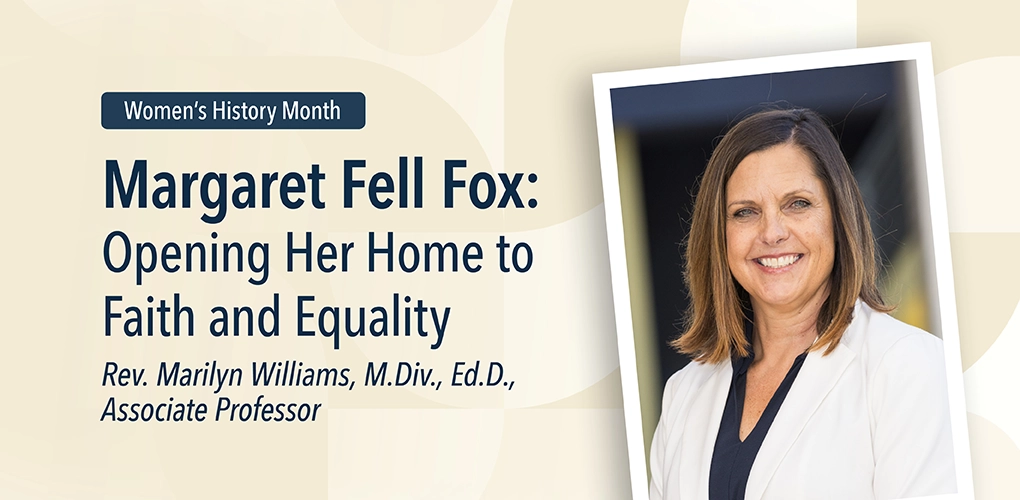
Margaret Fell Fox: Opening Her Home to Faith and Equality
By Rev. Marilyn Williams, M.Div., Ed.D., Associate Professor – School of Theology & Leadership
In an era when women’s voices were silenced in Christian leadership and preaching, Margaret Fell Fox
(1614- 1702) revolutionized and championed women’s voices in and outside of the church. Margaret
was born in England in 1614. As a young woman, she married Thomas Fell, a prominent lawyer, judge,
and parliament member during England’s time of significant religious and political turmoil. Connected to influential circles in the 17th century, Margaret and Thomas’ estate home became a hub for intellectual and spiritual lively discussions with many visitors.
In 1652, George Fox, the founder of what would soon become the Religious Society of Friends
(commonly known as Quakers) visited Margaret and Thomas’ estate home. During his stay, George Fox preached a radical message, proclaiming God’s anointing of persons regardless of gender, class, or
education. This radical message resonated deeply with Margaret, transforming her worldview toward
spiritual equality for all, including leadership and preaching in the church. Subsequently, Margaret
opened their estate to host Quaker meetings and advocated for religious equality for women and other
under-privileged citizens. During this time, Margaret also became an active writer on behalf of the
Friends (Quaker) movement. Margaret continued to defend Quaker liberties for all even after her
husband’s death in 1658.
Writing the Words of Equality
Over the course of time, Margaret wrote biblical apologetics in defense of women as leaders and
preachers in the church, resulting in 16 books. Four of the 16 books were translated into Dutch, two
were translated into Hebrew, and one into Latin. While Margaret proved invaluable to the Quaker
movement, authorities viewed her actions as inappropriate for a widow of a former respected judge.
Advocating for religious equality, both George Fox and Margaret Fell were arrested and imprisoned
under the Conventicle Act of 1664. In 1666, during her imprisonment, Margaret wrote a treatise,
entitled, “Women’s Speaking Justified, Proved and Allowed by the Scriptures” (William Andrews Clark Memorial Library, 1979), promoting women in ministry and the equality of the sexes in the power and authority of the Spirit. Margaret’s treaty was a powerful argument and the first of its kind to be published, advocating for women’s unrestricted right to preach based on Christ indwelling in both men and women (Wallace, 1992). As Fell and Fox worked closely together, advocating for women’s right to lead and preach in religious contexts, they married in 1669 to counter any scandalous accusations. Although they were often separated by missionary journeys and imprisonments, their marriage and lifelong friendship endured. Both Margaret and George lived to see England’s “Declaration of Indulgence for all Nonconformists” in 1687, which brought new religious and political freedom for all. Margaret survived George’s passing by ten years and became an indelible champion for the Quaker movement.
Margaret Fell Fox’s life provided a legacy of relevant implications for women in church leadership and
preaching roles. Her writing and preaching provides profound insights in today’s
contemporary discussion about women in pastoral roles. From Genesis to Revelation, Margaret
demonstrated a theological foundation based upon biblical apologetics supporting the validity of
women voices in religious leadership and preaching. Margaret also emulated the efficacy of women in
leadership and preaching roles through her effective administration, organization of meetings, and
writing for the Quaker movement. Ultimately, Margaret faced the established opposition of her day with a courageous, faithful, and persevering witness, even facing imprisonment for her biblical convictions.
Finally, Margaret’s writings provided numerous published works that effectively challenged systematic
barriers through theological defenses for women in religious leadership and preaching roles.
Women’s Equality in Religion
In addition to Margaret advancing women in church leadership and preaching roles, George Fox’s
Quaker movement became one of the first Christian denominations to officially recognize women’s
spiritual equality, leadership authority, and preaching gifts. Margaret’s contributions spurred on later
movements for women’s rights, with many early suffragists emerging from Quaker backgrounds.
Margaret’s life, inspiration, and persevering work continue to speak today. Today’s contemporary
context continues to wrestle with questions of women’s roles in leadership. Margaret’s theological
apologetics continue to provide a strong case, insisting that spiritual authority derives from divine calling rather than gender (Priscilla Papers, Margaret Fell; 1614-1702). Margaret’s legacy invites us to imagine faith communities where all voices—women and men—are valued as essential expressions of the image of God impressed upon humanity, both male and female. Her pioneering efforts to establish
women’s right to speak and lead in religious settings laid the groundwork for continued conversations
about inclusive ministry and the fullness of gifts that women bring to pastoral leadership.
References
Priscilla Papers. Margaret Fell (1614-1702): A brief biography of the mother of Quakerism.
https://www.cbeinternational.org/resource/margaret-fell-1614-1702/
Wallace, T.H. (1992). A sincere and constant love: An introduction to the work of Margaret Fell.
Richmond Friends United.
https://scholar.google.com/scholar?hl=en&as_sdt=0%2C5&q=A+Sincere+and+Constant+Love
%3B+An+Introduction+to+the+Work+of+Margaret+Fell.+&btnG=
Williams Andrews Clark Memorial Library (1979). Women’s speaking justified (No.194). ,
University of California. https://newlights.thebornes.org/wp-
content/uploads/2012/10/WomenSpeakingJustified.pdf
